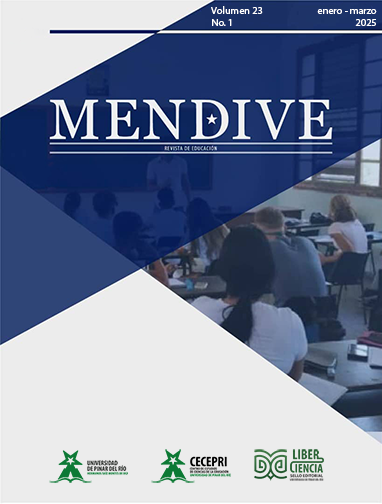Strategy for emotional self-regulation in virtual learning environments
Main Article Content
Abstract
Emotional self-regulation is essential in education, both in-person and online, for the academic performance and well-being of students. Accordingly, the Universidad Bolivariana del Ecuador uses Moodle as a virtual environment, but does not have a specific space for students' emotional self-regulation. Therefore, the following general objective was proposed: to design an emotional self-regulation strategy that favors academic performance in virtual learning environments for students of the Master's in Education. Consequently, a mixed research was carried out, combining elements of quantitative and qualitative research. The quantitative research involved surveys to measure emotional self-regulation and academic performance of students in the virtual learning environment. Meanwhile, the qualitative research included interviews with teachers and experts to understand experiences and challenges. The population was 1,650 students, selecting a non-probabilistic sample of 52 students from the master's degree. The categories used were emotional self-regulation and academic performance, subdivided into dimensions such as emotional state and adopted strategies. Scales and open questions were considered to measure the categories. The results included a positive relationship between emotional self-regulation and academic performance. Therefore, a strategy was generated for the inclusion of a section in the subjects, focused on emotional self-regulation in virtual learning environments, to improve the academic performance and emotional well-being of the master's students. The importance of validating the proposed strategy through feedback from experts was highlighted.
Downloads
Article Details

This work is licensed under a Creative Commons Attribution-NonCommercial 4.0 International License.
References
Berridi Ramírez, R., & Martínez Guerrero, J. I. (2017). Estrategias de autorregulación en contextos virtuales de aprendizaje. Perfiles Educativos, 39(156), 89-102. https://doi.org/10.22201/iisue.24486167e.2017.156.58285
Goleman, D. (1995). Inteligencia emocional. Editorial Kairós. https://www.editorialkairos.com/catalogo/p/inteligencia-emocional
Gross, J. J. (1998). The emerging field of emotion regulation: An integrative review. Review of General Psychology, 2(3), 271-299. https://doi.org/10.1037/1089-2680.2.3.271
Artino, A. R., Jones, K. D., & Kennedy, M. (2019). Promoting academic emotions and self-regulation in an online learning environment. Educational Technology Research and Development, 67(5), 1205-1224. https://doi.org/10.1007/s11423-019-09699-6
Richardson, J. C., Maeda, Y., Lv, J., & Caskurlu, S. (2017). Social presence in relation to students' satisfaction and learning in the online environment: A meta-analysis. Computers in Human Behavior, 71, 402-417. https://doi.org/10.1016/j.chb.2017.02.001
Orozco-Vargas, A. E., García-López, G. I., Aguilera-Reyes, U., & Venebra-Muñoz, A. (2021). Versión en Español del Emotion Regulation Skills Questionnaire: Análisis de su Fiabilidad y Validez. Revista Iberoamericana de Diagnóstico y Evaluación - e Avaliação Psicológica, 61(4), 189-203. https://doi.org/10.21865/ridep61.4.13
Palma-Delgado, G. M., & Barcia-Briones, M. F. (2020). El estado emocional en el rendimiento académico de los estudiantes en Portoviejo, Ecuador. Dominio de las Ciencias, 6(2), 72-100. https://doi.org/10.23857/dc.v6i3.1207
Puerto Menéndez, O., Fuentes Aparicio, A., Campuzano Toro, D. A., & Cantos Pinargote, S. A. (2021). Contexto emocional y virtualidad: percepciones de un profesorado afectivo. Revista Cognosis, 8(4), 39-46. https://doi.org/10.33936/cognosis.v8i4.5606
Moreno Núñez, E. E., Saltos Salazar, L. F., Gavilanes López, W. L., & Andrade Albán, J. R. (2023). El estado emocional y el rendimiento académico: Una aproximación a la realidad actual. Conciencia Digital, 6(1.4), 524-550. https://doi.org/10.33262/concienciadigital.v6i1.4.201
Mayer, J. D., & Salovey, P. (1997). ¿What is emotional intelligence? In P. Salovey & D. Sluyter (Eds.), Emotional development and emotional intelligence: Educational implications (pp. 3-31). Basic Books.
Vargas Olano, M. O., Herrera Delgado, C., López López, A., & Ávila Yacamán, M. (2023). Fortaleciendo la autorregulación en educación superior virtual y a distancia. Revista Cubana de Educación Superior, 42(1), e2676. https://scielo.sld.cu/scielo.php?pid=S0257-43142023000100013&script=sci_arttext


